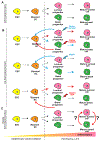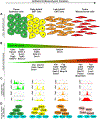Phenotypic Plasticity: Driver of Cancer Initiation, Progression, and Therapy Resistance
- PMID: 30554963
- PMCID: PMC7297507
- DOI: 10.1016/j.stem.2018.11.011
Phenotypic Plasticity: Driver of Cancer Initiation, Progression, and Therapy Resistance
Abstract
Our traditional understanding of phenotypic plasticity in adult somatic cells comprises dedifferentiation and transdifferentiation in the context of tissue regeneration or wound healing. Although dedifferentiation is central to tissue repair and stemness, this process inherently carries the risk of cancer initiation. Consequently, recent research suggests phenotypic plasticity as a new paradigm for understanding cancer initiation, progression, and resistance to therapy. Here, we discuss how cells acquire plasticity and the role of plasticity in initiating cancer, cancer progression, and metastasis and in developing therapy resistance. We also highlight the epithelial-to-mesenchymal transition (EMT) and known molecular mechanisms underlying plasticity and we consider potential therapeutic avenues.
Keywords: cancer; epithelial to mesenchymal transition; plasticity; therapy resistance.
Copyright © 2018 Elsevier Inc. All rights reserved.
Figures


References
-
- Aceto N1, Toner M2, Maheswaran S3, Haber DA4. En Route to Metastasis: Circulating Tumor Cell Clusters and Epithelial-to-Mesenchymal Transition. (2015) Trends Cancer 1(1):44–52. - PubMed
-
- Arienti et al., 2013b;
-
- Beck B, Lapouge G, Rorive S, Drogat B, Desaedelaere K, Delafaille S, Dubois C, Salmon I, Willekens K, Marine JC, Blanpain C.Different levels of Twist1 regulate skin tumor initiation, stemness, and progression. (2015) Cell Stem Cell 16(1):67–79. - PubMed
-
- Bedogni et al., 2008
Publication types
MeSH terms
Grants and funding
LinkOut - more resources
Full Text Sources

